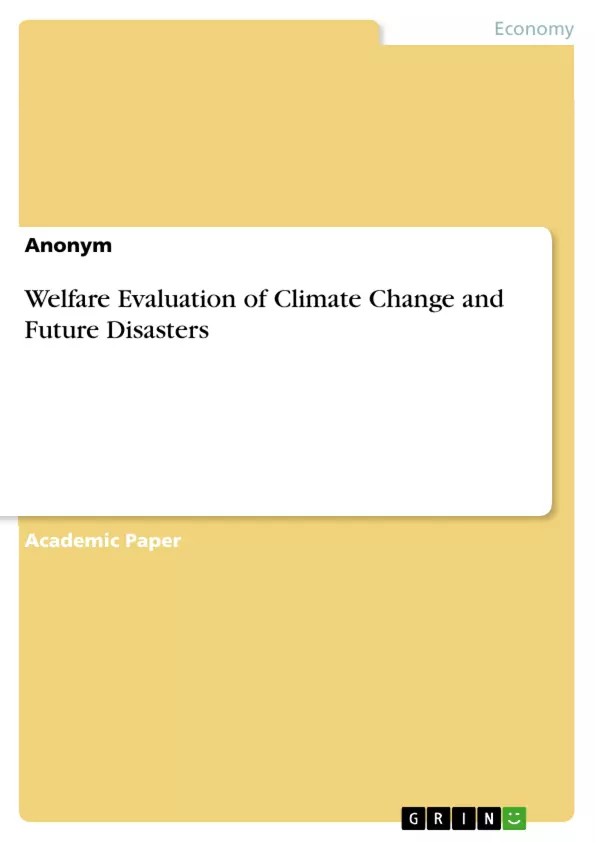After a short review of traditional welfare evaluation of climate change the paper turns its focus especially on uncertainty and reviews in this context the appropriateness of commonly used economic models for advising climate policy.
Climate policy with regard to welfare optimization needs to focus on long-term development in the context of a sustainable future. Two prominent debates have been raised and sharply discussed. First, the long-term view has been highlighted by the appearance of the Stern review, which triggered a lively discussion on an adequate discount rate in the last decade. Second, the probability of the occurrence of severe disasters has been stressed. These considerations are mainly based on fat tails of a probability distribution, an issue initially raised by Weitzman. Based on structural uncertainties of input factors like climate sensitivity, society might experience an infinite high loss for low likelihood catastrophic disasters. His assumptions have been carefully scrutinized and revised in literature, which additionally provoked the question of applicability of traditional economic models. In addition, raising concerns are the potential tipping points that may lead to unpredictable impacts. A stringent policy has been suggested which can be mitigated over time while learning more about uncertainties through investigations.
Inhaltsverzeichnis (Table of Contents)
- Introduction
- Climate Change and Sustainable Development
- Welfare Evaluation and Terminology
- Review of Literature and Findings
- Discount Rate
- Predictions and Uncertainties
- The Role of Uncertainty
- Weitzman's Dismal Theorem
- Validation and Criticism
- State of Affairs and Non-probabilistic Models
- Conclusion and Outlook
Zielsetzung und Themenschwerpunkte (Objectives and Key Themes)
The objective of this paper is to evaluate the welfare implications of climate change and future disasters, focusing on the role of uncertainty. It reviews how traditional economic models are used to advise climate policy, exploring the challenges posed by uncertainty and the potential for catastrophic disasters. The paper critically examines the application of cost-benefit analysis (CBA) and integrated assessment models (IAMs) in the context of climate change and investigates alternative approaches to address uncertainties.
- Welfare Evaluation of Climate Change
- Uncertainty and Catastrophic Disasters
- Appropriateness of Economic Models
- Social Cost of Carbon (SCC)
- Discount Rates and Intergenerational Equity
Zusammenfassung der Kapitel (Chapter Summaries)
- Introduction: This chapter introduces the concept of climate change as a major global risk with potential impacts on future generations. It discusses the challenges of measuring and valuing these impacts and emphasizes the importance of developing robust models for policy guidance.
- Review of Literature and Findings: This chapter provides an overview of existing research on climate change and welfare evaluation. It examines the debate surrounding the appropriate discount rate for future costs and benefits and discusses the difficulties in predicting climate impacts and uncertainties.
- The Role of Uncertainty: This chapter delves into the complexities of uncertainty in climate change analysis. It explores Weitzman's Dismal Theorem and its implications for the use of standard economic models. The chapter critically examines existing approaches for dealing with uncertainty and discusses the need for alternative methods.
Schlüsselwörter (Keywords)
The key themes and concepts explored in this paper include climate change, welfare evaluation, uncertainty, disasters, cost-benefit analysis, integrated assessment models, discount rate, social cost of carbon, and the Dismal Theorem.
Frequently Asked Questions
What is "Weitzman's Dismal Theorem"?
It is a theory suggesting that the probability of catastrophic climate disasters (fat tails) can make traditional cost-benefit analysis ineffective due to potentially infinite losses.
Why is the discount rate controversial in climate policy?
The choice of discount rate determines how much we value the well-being of future generations compared to current costs, as highlighted in the Stern Review debate.
What are "Integrated Assessment Models" (IAMs)?
IAMs are economic models used to advise policy by combining climate science with economic impacts to calculate the Social Cost of Carbon (SCC).
What are "tipping points" in the context of climate change?
Tipping points are thresholds that, if crossed, lead to unpredictable, large-scale, and potentially irreversible impacts on the global climate system.
How should uncertainty influence current climate policy?
The paper suggests a stringent initial policy that can be adjusted as society learns more about climate sensitivities and structural uncertainties.
- Quote paper
- Anonym (Author), 2016, Welfare Evaluation of Climate Change and Future Disasters, Munich, GRIN Verlag, https://www.grin.com/document/909629



